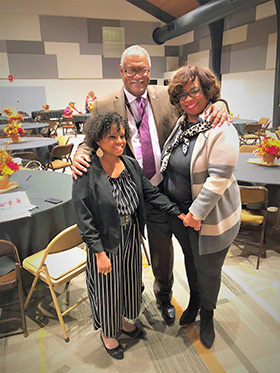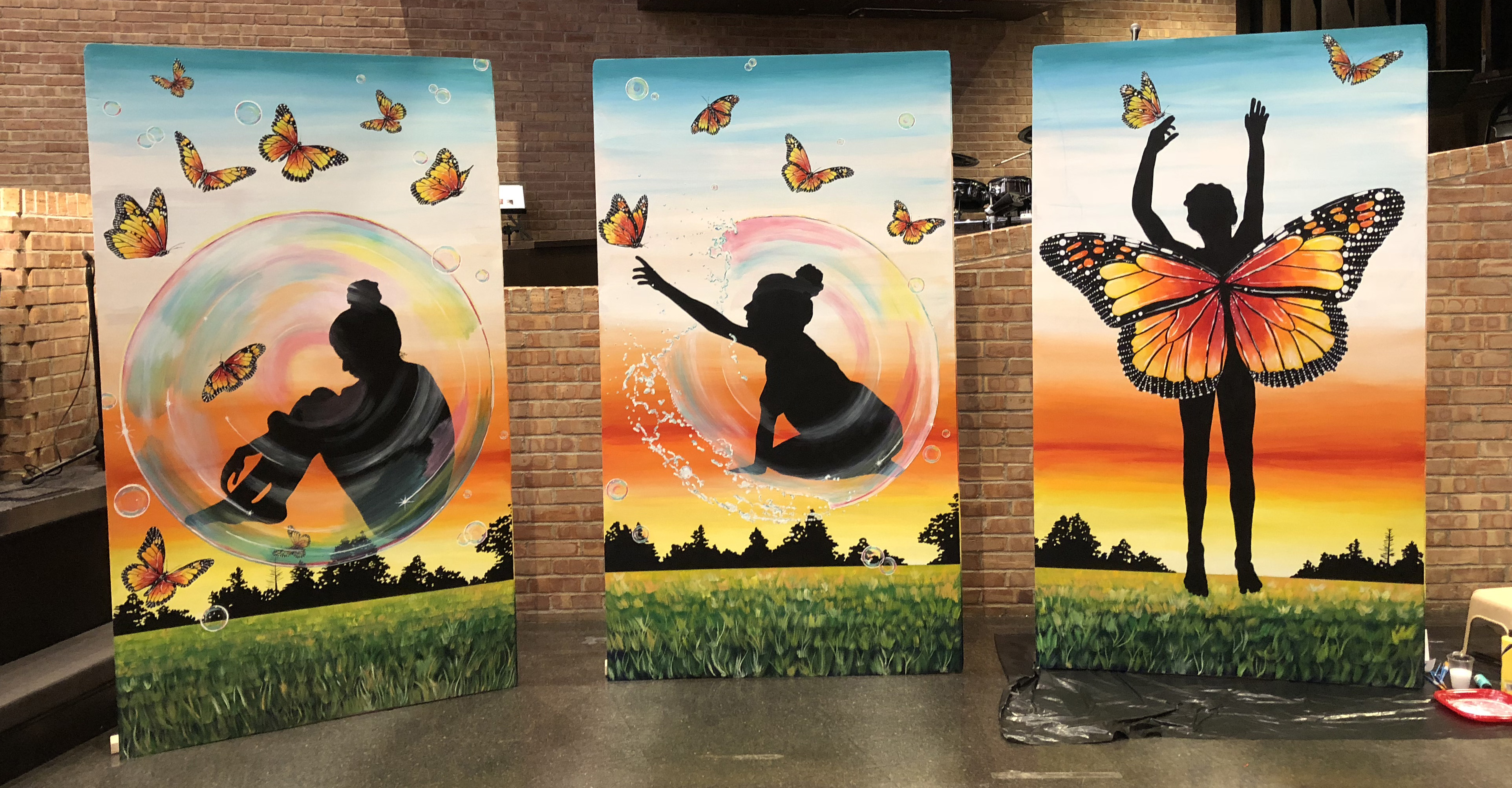Say the words “AIDS” and “HIV” out loud. Put the words — in all caps — in the church bulletin’s prayer concerns section and don’t shy away from the conversation.
These suggestions were among those offered — and repeated — during the recent Global AIDS Conference on how the church can help end stigma for people living with HIV and AIDS.
“Breaking Barriers,” held Oct. 25-27 at St. Luke’s United Methodist Church, gathered 140 people representing a spectrum of the population, including people of faith, health care professionals and advocates, community leaders, volunteers and people living with HIV, to discuss strategies for saving lives and increasing awareness.
Eighteen workshops, four panels and two keynote addresses tackled the topic of HIV/AIDS as it relates to a cross section of the population, including those dealing with aging, the opioid epidemic, tuberculosis, and the church.

Bishop Julius C. Trimble and his wife, Racelder Grandberry-Trimble (right), meet with Hydeia Broadbent, international AIDS activist, during the Breaking Barriers Global AIDS Conference in Indianapolis. Photo by Crystal Caviness, United Methodist Communications.
There is a way to promote HIV/AIDS awareness within the church without condemning people, International AIDS activist Hydeia Broadbent told the group.
Broadbent, 34, was diagnosed as HIV-positive at the age of 3 and first spoke publicly about her status when she was 6 years old.
One suggestion, she said during her keynote address, is to include HIV/AIDS information during church-sponsored health fairs, alongside materials about other conditions like diabetes and high blood pressure. Make sure HIV/AIDS is a part of all health-related discussions, she added.
Jeanne White-Ginder — mother of the late Ryan White, the teenager who became an international voice for those living with HIV/AIDS in the 1980s — reminded the conference attendees of her son’s greatest hope.
“Ryan always said, ‘I want to make AIDS a disease, not a dirty word,’” said White-Ginder.
In hopes of reducing stigma, White-Ginder has spent the 28 years since her son’s death at the age of 18 telling his story. White was banned from school following his AIDS diagnosis and his mother reminds people of the prejudice and pain their family experienced.
For her efforts, the Global AIDS Committee presented White-Ginder with the AIDS Leadership Award during the conference. Other AIDS Leadership Award recipients were Brian Montgomery, chairman of the West Ohio Conference AIDS Task Force; Dr. Narasappa Mathew Samuel, professor and president of the AIDS Society of Asia and the Pacific; and Dr. Irma Clark, chairwoman of the Northern Illinois Conference HIV/AIDS Task Force.
United Methodist Bishops Minerva Carcaño (California-Nevada Conference), Tracy Smith Malone (East Ohio Conference), Julius Trimble (Indiana Conference) and retired Bishop Fritz Mutti also attended the event. Trimble is chair of the United Methodist Global AIDS Committee.
“This event underscored the ongoing need for support for those living with HIV and AIDS — the need for love and acceptance, resources and treatment and the desperate need to eradicate stigma,” said Linda Bales Todd, a committee member and the conference organizer.
How to help
“The church can play a pivotal role in all this. Embracing all God’s children as people of sacred worth is a message needed not only from the church but society.”
The need for the church to be part of the global HIV/AIDS dialogue was a recurring theme from the podium throughout the conference, with faith leaders among those making written pledges to either start or keep the conversation going in an effort to break through the barrier
that stigma creates.
“I know more and will now do more,” Bishop Trimble said after the event. “We learned from those living with HIV that the church can do much more, beginning with education and collaboration. Stigma can be countered by breaking the silence and advocating for training and increasing access to treatment and education.”
The goal was to change the narrative from what is not happening to what can be done better, the bishop noted. To fully be the church “will require us to address stigma,” he said.
“No racial or ethnic group is exempt and no excuses were accepted,” Trimble said.
The Global AIDS Committee is planning a one-day conference scheduled for the day before the 2020 General Conference begins in Minneapolis in May 2020.

View of the completed triptych by the Rev. Kristine Marshall showing the metamorphosis to butterfly. Photo by Crystal Caviness, United Methodist Communications.
Caviness is a senior public relations specialist at United Methodist Communications in Nashville, Tennessee. She can be reached at ccaviness@umcom.org.
News media contact: Linda Bloom, (615) 742-5470 or newsdesk@umcom.org. To get more United Methodist news, subscribe to the free Daily or Weekly Digests.
Like what you're reading? Support the ministry of UM News! Your support ensures the latest denominational news, dynamic stories and informative articles will continue to connect our global community. Make a tax-deductible donation at ResourceUMC.org/GiveUMCom.




